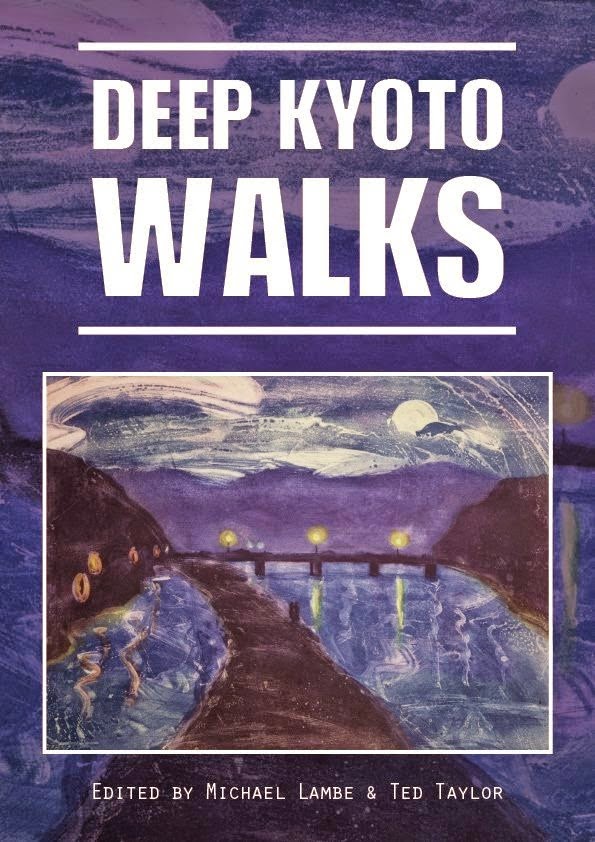Saturday, October 28, 2006
Suddenly Last Summer
Late July.
I was walking through a light mountain rain toward the Western District of Hiei-zan. I lowered my head to avoid banging it on the walkway of the twin dumbbell-shaped temples of Jogyo-do and Hokke-do, then passed into the large courtyard of Shaka-do. Finding a dry place to sit, I alternated between staring into the forest and dipping into my secondhand copy of that classic Kyoto guidebook by Gouveneur Mosher. (I was surprised to find inside a bookmark which the book's previous owner had picked up at Beijing's Pass-by Bar in 1999. I'd had lunch there a few months before.)
I was walking because I decided to blow off the lectures going on back at a lavish hotel in the Eastern District. The morning lecture had been good, covering the basic tenets of Tendai Buddhism, but the two afternoon talks were on psychology. MatsuMiki was interested but I wasn't, so after a huge macrobiotic lunch, I set off alone into the rain.
I'd been wanting to attend this event, the Kaihogyo, for about a decade, after reading about the Marathon Monks of Hiei in another classic book, this one by John Stevens. (More info here: http://en.wikipedia.org/wiki/Tendai_Marathon_Monks) Later that night, we would trek 40 km throught the dark behind a man who had followed this path over a 1000 times before. After a few hours sleep, we arose at 1 am and met in front of the hotel. My grogginess was beginning to clear as we knelt in prayer before Konpon-chu-do. Suddenly, we moved along the paths at a surprisingly quick pace. The rain had cleared but the clouds kept everything below the knees in darkness. I was carrying a small flashlight which I'd "borrowed" from the hotel, unplugging it from the outlet nearest the door to my room. But after the first initial descent down a long flight of stone steps wet with rain, I decided to trust my footing, rely on instinct. As this was a pilgrimage, I was channeling Thich Nhat Hahn, peace and mindfulness in every step. I did slip a few times, mainly snagging my feet on tree roots. Even those with lights slipped occasionally, shooting a kaleidoscope of flashlight beams into the trees. A lot of these pilgims were past middle age, and as I watched them slip, I began to see the nature of broken hips: of the shock at sudden loss of balance and the quick, jerky, unconscious thrust of a leg to stop the fall. The only one of us with sure footing was the monk's dog which dashed along the trail, appearing and disappearing into the dark. But then again, he had four.
During our walk, we would often stop to pray at various spots which our guide, the Gyoja, had long ago memorized. Many were temples, some were statues, but most were simply trees or stones, which could signify that this pilgrimage goes way back to more animistic times. The prayers would last only a few seconds--a rustle of beads, a few muttered words, then we'd be off again. We walked on, along the ridges, the lights of both Kyoto and Biwa's cities far below us but above the heads of people sanely sleeping away the muggy mid-summer night. Up here, the man-made concepts of time and distance meant nothing. We would finish this hike when it was finished. I liked the idea of this, of doing a task for its own sake. I was beginning to envy the monks, passing a life this way for seven years. But then it hit me. Isn't their training, as amazing as it is, merely a long, deluded attachment to the completion of it?
We had a long tea break in the far western park of the mountain. I had been chosen to ring the temple's bell for some reason, and having done that, the 60 of us began to descend east toward Biwa-ko. The sun began to rise then, giving me for the first time a clue as to the chronological time. In the dull blue light, I thought that lakeside Shiga looks a little like Hong Kong.
It was full dawn when we reached Hiyoshi Taisha and the mountain's base. We took a long break at a temple nearby for more tea and onigiri. We'd lost quite a few people on the way, but I was surprised to see one woman in her 70s who we'd met on the bus. MatsuMiki also began to talk to a smiling, almost Gollum-like 85-year-old. I wondered how they'd fare next, on an almost vertical 14-km climb back up to the temple.
Six hours after we started, MatsuMiki and I were among the first to arrive back at Enryaku-ji. There were only about 15 people present for the closing prayers. I have no idea whether the rest were still behind or had given up and were snoring comfortably in their hotel beds. As for us, we had enough time for a long bath before we took a bus back to the Kyo.
Slept most of the afternoon, then hopped a bus back to the Nog. The next morning I'd be loading a truck, saying goodbye to my home of 12 long years.
On the turntable: "Bombay Dub Orchestra"
On the nighttable: Uno Chiyo, "Confessions of Love"
Subscribe to:
Post Comments (Atom)

1 comment:
Sounds like a good day!
I really like the Stevens book too.
How are things going for you at the Choufukan?
Al
Post a Comment